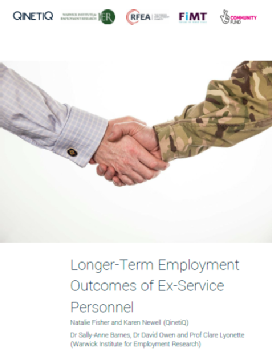IER News & blogs
More support needed to help veterans reach their full potential
 A new report, Longer-term Employment Outcomes of Ex-Service Personnel, looks beyond the first two years of resettlement.
A new report, Longer-term Employment Outcomes of Ex-Service Personnel, looks beyond the first two years of resettlement.
This research has found that UK veterans face challenges finding longer-term civilian careers that enable them to reach their full potential. The Longer-term Employment Outcomes of Ex-Service Personnel report from QinetiQ, in partnership with Warwick Institute for Employment Research and RFEA – The Forces Employment Charity, and commissioned by Forces in Mind Trust (FIMT), is one of the first UK studies to explore the longer-term employment outcomes for veterans, beyond the first two years of resettlement.
The research found that while the majority of ex-Service personnel maintain employment over time, it can often involve numerous jobs and periods of unemployment. Not all ex-Service personnel reported being satisfied with their civilian job or career; less than half (44.5%) felt that they found the ‘right job’ for them in the longer-term and which maximises their potential (42.5%) or provides them with opportunities to progress (42.4%).
The research recommends several initiatives to better prepare Service leavers for the civilian labour market and to ensure that employers can take advantage of this skilled cohort. They include:
- Access to civilian work placements, building knowledge for transition and innovation within the Armed Forces, for all Service personnel.
- Mandatory transition support for all Service leavers.
- Training on commercial, marketing, and financial skills as part of the Resettlement package for all personnel.
- Improved data collection on the employment outcomes of ex-Service personnel and their families to ensure government and support services can effectively identify challenges and respond effectively.
Some groups face greater challenges when leaving the Armed Forces, making them more likely to experience unsuccessful employment in the longer-term. This includes women, ethnic minorities, those who are wounded, injured and sick, and older Service leavers. In addition to demographic factors, unrealistic expectations of the civilian job market, a lack of transferrable skills and an inability to adapt to civilian environments were all found to persist over the longer-term and reduce the chances of a successful transition out of the Armed Forces.
